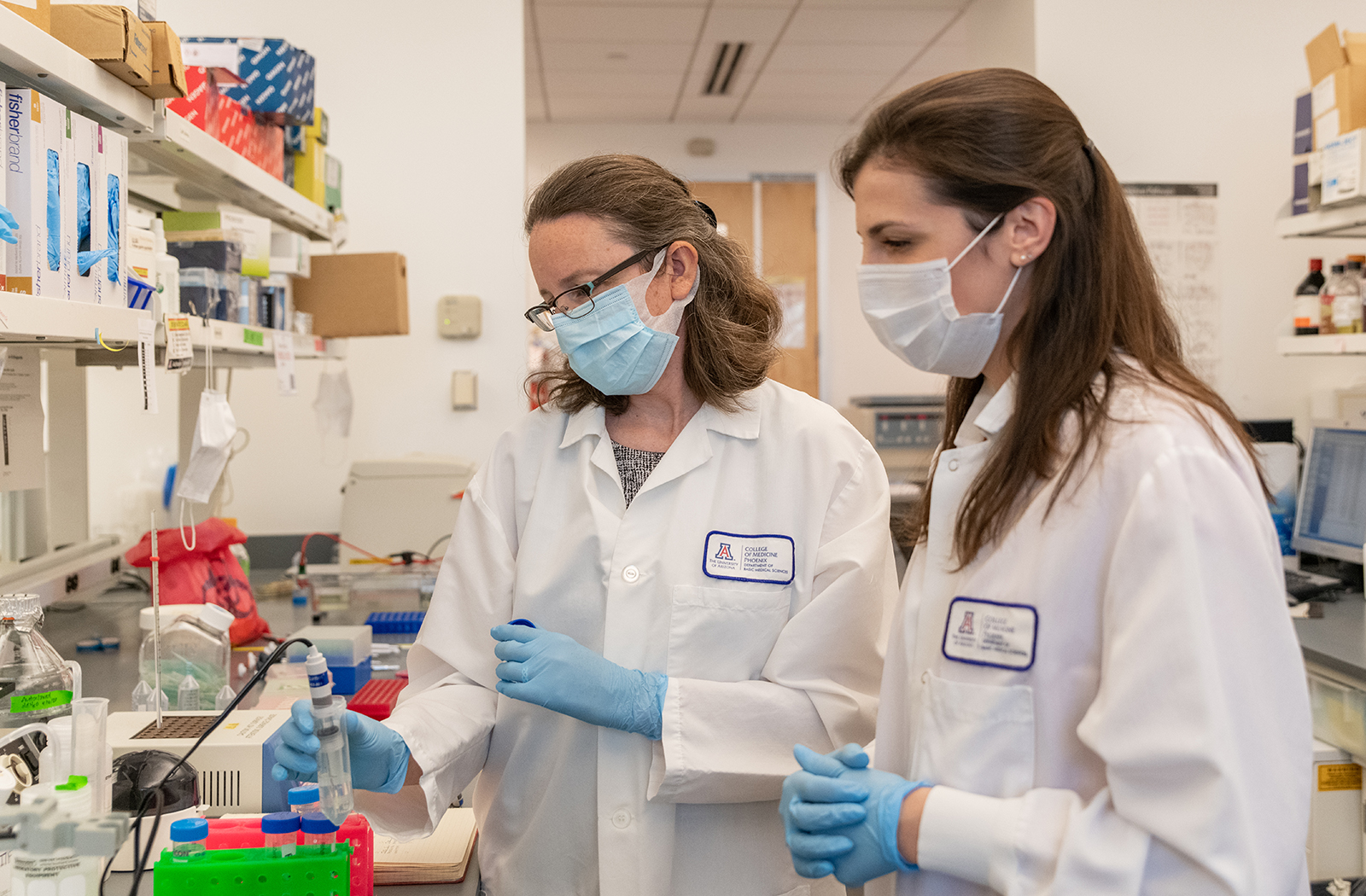
Researchers Awarded $8 Million Grant to Study Depression and Cardiovascular Disease

Researchers are trying to better understand the sex differences of one of the primary causes of disability worldwide, the co-occurrence of major depression and cardiovascular disease. Major depression is common in people who suffer a major cardiac event, affecting up to 40 percent of such patients, according to studies.
A collaborative research award examining this between Massachusetts General Hospital, Harvard School of Public Health, Colorado State University and the University of Arizona College of Medicine – Phoenix received an $8 million specialized center grant for research on sex differences (SCORE) from the National Institutes of Health (NIH) Office for Research on Women’s Health and the National Institute of Mental Health. About $1 million is earmarked for research to be conducted at the U of A College of Medicine – Phoenix.
Taben Hale, PhD, an associate professor in the Department of Basic Medical Sciences at the College of Medicine – Phoenix, is a co-investigator on the project, which is led by co-principal investigators Jill Goldstein, PhD, a professor of psychiatry and medicine and executive director of the Innovation Center on Sex Differences in Medicine at Massachusetts General Hospital and Harvard Medical School, and Robert Handa, PhD, a professor in Biomedical Sciences at Colorado State University and the U of A College of Medicine – Phoenix.

The NIH grant will fund three integrated studies that include:
- A population-level clinical neuroscience study relating prenatal stress and immune biomarkers to sex differences in brain circuitry and physiologic deficits in response to stress in MDD in early midlife.
- Testing a novel therapeutic device to target the central nervous system’s control of mood and autonomic nervous system, which regulates bodily functions like heart rate, and associated physiology to reduce these sex-dependent deficits in MDD.
- Experimental studies that will identify the mechanistic pathways in the brain involved in projects one and two.
The first two projects will be performed at Massachusetts General Hospital under the leadership of Dr. Goldstein, Ronald Garcia, MD, PhD, and Vitaly Napadow, PhD. The third project is directed by Dr. Handa, and the work will be performed at Colorado State University and U of A College of Medicine – Phoenix in the laboratory of Dr. Hale.
The specific work at U of A is to evaluate the impact of prenatal stress on regulation of blood pressure and heart rate, as well as behavioral function. Assessments will evaluate the impact of prenatal glucocorticoid exposure on behaviors that are suggestive of anxiety and depression. Glucocorticoids, including cortisol, are hormones that are increased in response to stress. U of A researchers also will evaluate the potential therapeutic efficacy of transcutaneous vagal nerve stimulation — involving regular, mild pulses of electrical energy sent to the brain via a branch of the vagus nerve accessible in the outer ear — to reverse these effects.
“The scientific mission of this SCORE grant is to identify abnormalities, beginning in fetal development, that have shared consequences for sex differences in brain circuitry regulating mood, lifelong recurrence of MDD, hormonal imbalance, immune responses to stress, and autonomic and neurovascular dysfunction in early midlife and target these abnormalities using a novel neuromodulation technique,” Dr. Goldstein said. “The goal of this SCORE is to enhance our understanding of sex on MDD and translate this knowledge into sex-selective treatment strategies.”
According to researchers, MDD is associated with abnormalities in the stress response areas of the brain. These brain regions also regulate the autonomic nervous system, which is involved in the short-term regulation of blood pressure and heart rate. Dysregulation of the autonomic nervous system is associated with cardiovascular disease. In fact, women are at twice the risk for the co-occurrence of MDD, autonomic dysregulation and heart disease, leading to a 3-5-fold risk of death in women from heart disease, often with unrecognized and untreated MDD.
“This funding is critical to perform studies to advance our knowledge of the relationships between disorders of the brain and the heart, and to identify novel treatment strategies to specifically target cardiovascular disease and MDD,” Dr. Hale said.
Grant Number: NIH U54 MH118919. The Innovation Center on Sex Differences in Medicine at Massachusetts General Hospital is the primary site under Dr. Goldstein’s leadership. The total costs awarded are $8,130,603, with $1,005,425 awarded to Dr. Hale’s team.
About the College
Founded in 2007, the University of Arizona College of Medicine – Phoenix inspires and trains exemplary physicians, scientists and leaders to advance its core missions in education, research, clinical care and service to communities across Arizona. The college’s strength lies in our collaborations and partnerships with clinical affiliates, community organizations and industry sponsors. With our primary affiliate, Banner Health, we are recognized as the premier academic medical center in Phoenix. As an anchor institution of the Phoenix Bioscience Core, the college is home to signature research programs in neurosciences, cardiopulmonary diseases, immunology, informatics and metabolism. These focus areas uniquely position us to drive biomedical research and bolster economic development in the region.
As an urban institution with strong roots in rural and tribal health, the college has graduated more than 1,000 physicians and matriculates 130 students each year. Greater than 60% of matriculating students are from Arizona and many continue training at our GME sponsored residency programs, ultimately pursuing local academic and community-based opportunities. While our traditional four-year program continues to thrive, we will launch our recently approved accelerated three-year medical student curriculum with exclusive focus on primary care. This program is designed to further enhance workforce retention needs across Arizona.
The college has embarked on our strategic plan for 2025 to 2030. Learn more.